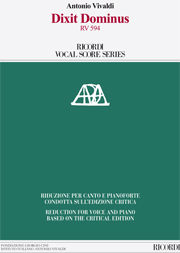
Antonio Vivaldi. Dixit Dominus, RV 594
Dixit Dominus, RV 594
Psalm 109 for two solo sopranos, solo tenor and solo bass, two choirs of four mixed voices, two trumpets, two oboes and strings divided into two ensembles
Reduction for voice and piano
“Edizione critica delle Opere di Antonio Vivaldi”
Ricordi, Milan, 2015
Even though there exists two equally fine settings by Vivaldi of this well-worn psalm text, this one will always remain his ‘great’ Dixit Dominus. Great in every sense: in scale; in fullness of scoring (two cori are employed); in the virtuosity it demands; in complexity of counterpoint (best displayed in the final fugue on a chaconne bass); in grandeur of conception. It appears to be a relatively late work (after the middle of the 1720s), but its circumstances of composition remain unclear. Theories about its genesis have come and gone, but it nevertheless seems clear that it was planned for performance at a major festival in an important Church. The composition is a fascinating mixture of traditional and innovative elements. It marks Vivaldi out as a ‘complete’ composer of sacred music whose imagination always remained fully responsive to the expressive potential of the liturgical text.
The Introduction and Critical Commentary for this vocal score, prepared by Antonio Frigé, is closely based on the Critical Edition by Paul Everett published in 2002.
